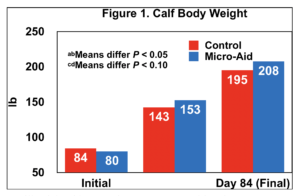
Micro-Aid® Benefits Dairy Calf Health
60 newborn calves were sourced from a commercial calf ranch (originating from 19 different farms before coming to the calf ranch) and housed outdoors in individual calf hutches (~25 ft2) bedded with sand. Calves were assigned to one of two treatments and then blocked by initial body weight and total serum protein (TSP): 1) Control; and 2) Micro-Aid® (0.04 ounces/head/day of Micro-Aid® Liquid 30 in milk replacer and 1.3 grams/head/day of Micro-Aid® Feed Grade Concentrate top-dressed on starter post-weaning). Calves were offered 700 grams of milk solids per day at 13.0% solids of a 22:20 commercial milk replacer. Starter (20% crude protein) and water were offered ad libitum. Calf performance was monitored throughout the study.

- Calves utilized in this experiment were considered high-risk, given the stress they experienced because of poor colostrum consumption, weaning, transportation, and calf ranch entry all within their early days of life. This was verified by assessment of total serum protein at study initiation and both treatment groups having a failure of passive transfer rate of 90%. Thus, this experimental model fully represented the stress and health challenges that dairy calves experience during their first few weeks of life.
- Micro-Aid® Liquid 30 supplementation to milk replacer increased calf body weight by 10 pounds at weaning. This benefit in body weight increased up to 13 pounds by the end of the study when Micro-Aid® Feed Grade Concentrate was added to the starter. Improvements in overall average daily gain, feed to gain and cost of feed to gain were also noted in calves supplemented Micro-Aid®.
- Benefits of Micro-Aid® supplementation are further supported by increased starter, water and total dry matter intake, as well as the fact that those calves took six fewer days to consume 100 grams of starter. Research suggests that better performance and health of young calves contributes to superior performance and longevity later in life.

